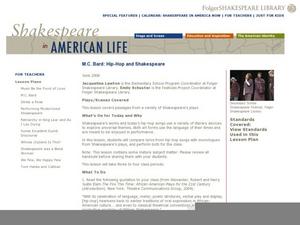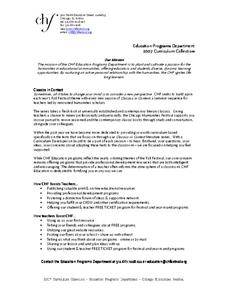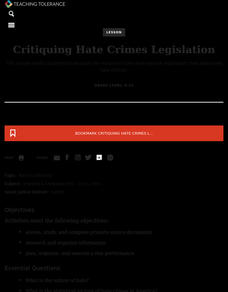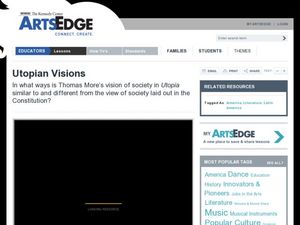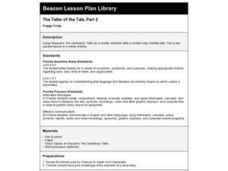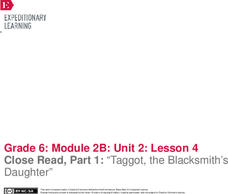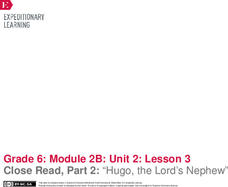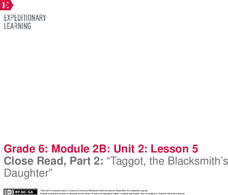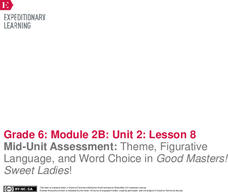Curated OER
Character
Students explore various methods of approaching character work, acting styles and skills. They create an original character, write an original monologue and perform the monologue for an audience
Curated OER
Red Ribbon Week
Students perform monologues about bullying and cyber-bullying. In this bullying and drama lesson plan, students write scenes while improvising before word processing the scenes. They put their work in order to present a show about...
Curated OER
Exploring American Tall Tales
Students explore elements of American folktales and tall tales. In this literature lesson, students read examples of American folktales and tall tales and prepare a monologue or news report to present to the class based on their readings.
Curated OER
Monologue Preparation
Tenth graders use a published monologue to create three various interpretations featuring different emotions. Following the presentation of the three interpretations to the class, the student will use self-evaluation and audience...
Curated OER
M.C. Bard: Hip-Hop and Shakespeare
What is poetry? Does hip-hop qualify as poetry? Do Shakespeare's monologues qualify as poetry? Class members grapple with these questions as they examine the poetic elements and themes presented in different texts. Groups of four study...
Utah Education Network (UEN)
Hamlet Soliloquy Artwork
Though this assignment may be thought madness, there is an actual method. Scholars perform a close reading of the original text of the soliloquies in Hamlet and modern translations to ensure they understand the speeches. They then select...
PBS
Family History: On Your Honor
What is your history? Scholars work with their own families to create a unique story of the courage and bravery of their ancestors. The third and final part of the series culminates in a creation of not just a family history, but a...
Curated OER
Shakespeare's Othello and the Power of Language
Students read and analyze Iago's rhetoric in specific monologues and dialogues with other characters, examine what Iago says and how he says it, define some basic rhetorical terms, and discover the sometimes dangerous power of language.
Curated OER
Beowulf
High schoolers complete literature analysis activities for Beowulf. They read lines from the poem and complete character analysis activities. In addition, they write and share a boast modeled on the text and then create heroes and...
Education Closet
West Side Shifts
Combine math, language arts, music, and dance with an activity focused on "America" from West Side Story. After listening to the song, learners compare the film to Romeo and Juliet, analyze the song's meter, design choreography, plan...
Teaching Tolerance
Critiquing Hate Crimes Legislation
The high school instructional activity explores what hate crimes are and how the government has responded to those crimes. Academics read legislation, analyze political cartoons, and complete hands-on-activities to understand what...
Curated OER
Writing Drama-Trying Your Hand at being a Playwright
Fifth graders chart the elements of drama. In this performing arts lesson, 5th graders discuss the role of a playwrite, practice doing some Reader's Theatre scripts, write a paragraph about a problem between two people, and perform their...
Curated OER
It's All in the Way You Say It
High schoolers unearth multiple meanings based on connotation and cadence. After defining denotation, connotation, and cadence, readers evaluate similar words to compare connotations. They then play with how cadence affects meaning by...
Curated OER
Developing Characterizations by Creating Stereotypes
High schoolers examine past and present cultures through theater. They interpret how theater reflects society. Students engage in the process that constitutes creation and performance in the theater. High schoolers explore the forces...
Curated OER
Slavery in Colonial America
Pupils examine the experience of the middle passage of slaves. They review slave songs and discuss their common themes. They develop a monologue in which they integrate a fragment of an actual slave song into a poem they have written.
Curated OER
Utopian Visions
High schoolers examine Sir Thomas More's Utopian vision. In this philosophy instructional activity, students read Utopia and determine the pros and cons of Utopian societies. High schoolers then create and present monologues of residents...
Curated OER
If I Could Talk Like the Animals. . .
Students read and discuss a film review of the animated movie Antz and then write a monologue from the perspective of a non-human organism.
Curated OER
Historical Perspective
Students research the different perspectives of important groups and figures involved in the American Revolution and apply their findings to write and perform monologues depicting this pivotal time in history.
Curated OER
The Teller of the Tale, Part 2
Students discuss character types and their qualities. They select two characters and write about their dress, speech, habits, attitudes and beliefs. They write a monologue as the characters presenting a moral theme.
Curated OER
Giving Voice to History
Learners examine the plight of Japanese Americans during World War II. In this World War II instructional activity, students participate in a mock evocation simulation, research primary and secondary documents about internment camps, and...
EngageNY
Close Read, Part 1: “Taggot, the Blacksmith’s Daughter”
There would be no luck if it were not for bad luck. Scholars take a close look at the theme of adversity through multiple reads of Taggot, the Blacksmith’s Daughter. They place sticky notes on important details of the story and complete...
EngageNY
Close Read, Part 2: “Hugo, the Lord’s Nephew”
No, not literally. Scholars read Hugo, the Lord’s Nephew to compare figurative and literal language. Readers learn about simile, metaphor, personification, and idioms with a graphic organizer. Pupils then answer text-dependent questions...
EngageNY
Close Read, Part 2: “Taggot, the Blacksmith’s Daughter”
It is just a figure of speech. Readers look for figurative language as they read Taggot, the Blacksmith’s Daughter. They complete a Figurative Language graphic organizer by recording and identifying the types of figurative language found...
EngageNY
Mid-Unit Assessment: Theme, Figurative Language, and Word Choice in Good Masters! Sweet Ladies!
Time to show what you know. Scholars complete a mid-unit assessment to demonstrate their learning from the past lessons. Learners work independently to identify the theme and answer questions about Pask, the Runaway. They also examine...
Other popular searches
- Mythological Monologues
- Dramatic Monologues
- Writing Monologues
- Monologues for Actors
- Drama Monologues
- Writing a Monologue
- Shakespeare Monologues
- Drama Abstract Monologues
- Writing a Dramatic Monologue
- Interior Monologues
- Environment Monologues
- Write a Monologue






